Brands We Love: Kia

Earlier this week while I was perusing Twitter, I noticed a large number of tweets surrounding an unlikely brand, Kia, and being a strong advocate of the brand, I was immediately intrigued. Though I hold it close to my heart and tell anybody who wants to listen how much I love Kia, I also know it’s typically not a highly talked about brand. So as you can imagine, I began to investigate the reason why. As it turns out, Kia made its debut this week on Interbrand’s 2013 Best Global Green Brands, which is Interbrand’s nod to the top ethical and ecologically responsible brands.
My affinity for the Kia brand began seven years ago, when I bought my Kia Sorento. Kia was in the process of repositioning itself in the American market from a not-so-glamorous automaker to a polished, design savvy one, all while still being an affordable option for American drivers. I’d like to think I was ahead of the curve when it came to Kia, but as it turns out I was fully falling into its plan of becoming a well-recognized and respected brand in America, and I don’t mind that one bit.
Instead of listing all the reasons why I love the Kia brand (and trust me, there are a lot), let’s take a look back at the brand’s history and how it has become one of the most valuable brands.
Kia’s storied past
Kia, South Korea's oldest car company, was founded on June 9, 1944 as a manufacturer of steel tubing and bicycle parts. In 1951, Kia switched gears a bit (pun intended) and began building complete bicycles. In 1952, Kia changed its name from Kyungsung Precision Industry and later built motorcycles (starting in 1957), trucks (1962) and cars (1974).
It wasn’t until 1992, that Kia Motors America was incorporated in the United States. Kia began sales operations in Portland, Oregon at four dealerships. Since then, Kia has expanded methodically, one region at a time. Fast forward to 2013, and Kia is the fourth largest automotive group in the world.
The Kia brand
When I began researching the Kia brand a bit more for this blog post, I was extremely happy to see that Kia’s website outlines its corporate identity.
One of the most fascinating aspects of the brand is its name, Kia. Without knowing when the name was chosen, its fascinating to see how the company’s success has mirrored the meaning of its name .
According to Kia’s website, the word Kia is derived from the Chinese letter “Ki,” meaning to “arise or come out of” and “a,” referring to Asia. When the two words come together Kia means to “arise or come out up out of Asia.”
Kia has emerged as one of the fastest-growing automobile brands, and it doesn’t appear to be slowing down anytime soon. The brand’s success has been attributed to its connection with millennials and Gen Y audiences by promoting uses of technology and connectivity that appeal to younger audiences. As a strong advocate for the Kia brand and self-proclaimed Kia driver for life, I’m excited to see how it responds to its growing popularity.
Sources:
Kia Corporate Website
Kia Motors enters Interbrand’s list of 50 best global green brands 2013
Refining the Hyundai-Kia brand plan
Product Naming Spotlight: The Transition
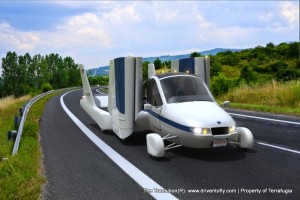
It's a bird ... it's a plane ... it's a car. Actually, it's two out of three: a plane that transitions into a road-use vehicle. Hence the name: The Transition.
For pilots, simply land at the airport, fold your wings up and drive home.
I appreciate the simplicity of the name selected by the manufacturer, Terrafugia. Appealing to the pain point of pilots who face a dilemma of transportation once they land their aircraft, the name speaks to the benefit of 'transitioning' from plane to road vehicle.
The company could have chosen a more unique approach; after all, this is basically the FIRST flying car. Are they leaving open space for future manufacturers to own the category with a more memorable name (think what Swiffer did to the sweeping/mopping category)? I'm not sure. With close to a $300,000 price point, I think they're pretty safe in the space right now.
Made in Detroit
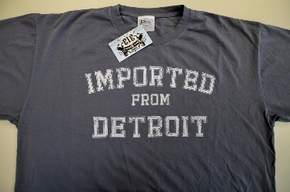
......................................................................................................................................................................
An article in Thursday’s (3/17, 2011) Wall Street Journal by Jeff Bennett, said Chrysler Group filed suit Tuesday to keep a local group from using “Imported from Detroit” on clothing. They want to stop Moda Group LLC from selling T-shirts and other clothing “branded with the words: Imported From Detroit” in their Pure Detroit store chain. The use of “branded with the words” is an interesting choice of words. A quick trademark search shows the phrase is currently Published for Opposition, or pending a final trademark. The mark is filed in multiple product categories covering everything from key chains to eye glasses. No doubt they plan on using the mark on all kinds of chotchki.
Is something like Imported From Detroit trademarkable? There are all kinds of problems with letting a private firm own a public property like a city’s name. The issue has even boiled over into international legal rights to use product descriptors like Champagne and Parmesan, because they do refer to a specific geographical location. So, is "Imported From Detroit" unique enough to be trademarked? Certainly Made In Detroit would not be. It’s a common usage phrase that is mandatory labeling for many products. But since Imported From Detroit is a turn of words based an import not coming from a foreign country, perhaps it is. It is a phrase that would not come about in ordinary language, unless you’re in another country.
Should Chrysler protect their mark from some little tourist store in Detroit or should they promote its use? Surely, they don’t expect proceeds from Imported From Detroit key chains, hats, and coffee mugs to be a real income machine? By simply allowing its use, they give up ownership, so they’ve got to make the effort. But would they be better off allowing its wide-spread use, as it promotes their products indirectly? You would think so – more awareness they do not have to pay for. Brand building is about building awareness and a set of specific associations. Perhaps the T-shirts are Made In China? Maybe the fashion associations of Chrysler and the Pure Detroit store chain clash. But, free publicity for your brand and your ideas? It seems like a no-brainer. Maybe the real problem was the ad agency seeing the free publicity as a threat to THEIR income stream.
There is no doubt that trademarks are an important part of our world of commerce, especially in an Information Economy where we are competing against low cost labor from other parts of the world. On the other hand, Imported From Detroit seems like something we all should have a right to use, if we have a product made in Detroit. Perhaps that’s a big IF? Regardless, it’s just another example of our ever more branded world.
Contributed by Bill Lippincott, Vice President
A Plethora of Product Placement
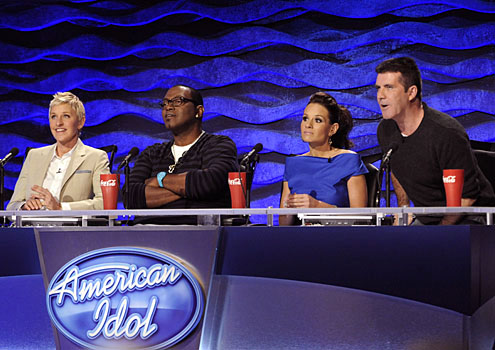
......................................................................................................................................................................
Did you know that Rock Hudson's character in the 1964 movie Man's Favorite Sport worked at Abercrombie & Fitch? Did you even know that A&F has been around since 1964?! Well, I didn't and was surprised to research that it was founded in 1892. But I digress.
I'm talking about product placement. Or "brand integration". Or blatant advertisments for products that show up during my favorite tv show that in no way seems to be just happenstance. I wonder if A&F's sales were boosted because of Rock's employment? Does any product placement actually boost the brand's sales or is it just a way for the entertainment industry to pay expenses? I cannot speak for all, but I did have a hankering for the peanut buttery, chocolatey goodness that is Reese's Pieces after watching E.T. Another oldie is Back to the Future 2. Pepsi, Nike & the DeLorean all had call outs throughout the entire movie. What about Castaway? I mean, Wilson was a main character without really being a character! I hear there is a game that Bond enthusiasts play while viewing any James Bond movie where they try to count as many product placement ads as possible; Aston Martin, Rolex, Omega & Coke Zero to name a few.
Music lyrics and videos aren't immune either. Lady Gaga receives calls from Beyonce on her Virgin Mobile LG Rumor2 in the "Telephone" video. Run DMC didn't just wear all things Adidas, they weren't about to trade their Adidas "for no beat up Bally's" in their song "My Adidas". And I will never be able to stretch during the 7th inning and not wonder if Jack Norworth got paid to give a shout out to Cracker Jacks when he penned "Take Me Out to the Ballgame" in 1908.
And still more in prime time television! Who hasn't watched "American Idol" and seen the judges with their ginormous red cups emblazened with the Coke logo? Jack Bauer of "24" fame drives a Ford Expedition. Who could forget KITT, the sleek Pontiac Trans Am partner to Michael Knight? Even the "good ol' boy" Duke cousins of Hazzard County, GA drove a custom 1969 Dodge Charger.
Alas, there are lots of examples of artists, movies or t.v. shows that feature product placement but receive no compensation. There was a recent episode of "Modern Family" that was based solely around the search for an Apple iPad. Producers and Apple alike state that no money exchanged hands for the use of the Apple brand. And I'm almost positive Janis Joplin didn't get a car when she co-wrote and sang "Mercedes Benz". Correct me if I'm wrong.
Are featured brands getting more business by product placement or are they just sponsors for your favorite movies, t.v. shows, musical artists and video games? Is it brand integration or celebrity endorsement? Would you ever NOT purchase a brand because of its product placement in the entertainment industry? Does it help the overall brand marketing? What other examples have you seen and heard?
Excuse me. I have a call coming in on my Sprint HTC EVO.
Contributed by: Jennifer Rodden
Brand Survival
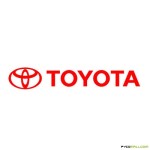
......................................................................................................................................................................
We’ve all heard about the hundreds of Toyota cars that have been recalled due to sticking accelerators and the pedal entrapment issues (or the "big boo boo"). While Toyota has to gone to great measures to fix these issues, an even bigger question remains. Will the Toyota brand survive this tremendous hit and how have they responded to this crisis? This is a touchy topic, for many reasons. How do you put trust back into a brand that’s caused so many tragedies by way of a seemingly easily fixable flaw? Read more
Go Forth and Add!
As we have learned from the Chevy Nova, it is important to perform an accurate linguistic screen in all markets where you intend to launch your product. As you may have heard, the Nova was not such a big hit with Spanish-speakers. Translated literally, its name means “star” but when spoken it sounds like “no va” meaning “it doesn’t go.” Oops.
Recently, PepsiCo announced that it is teaming up with Eva Longoria Parker to promote their new campaign, titled “Yo Sumo.” The campaign, inspired by this decade’s census, is to encourage Hispanics, especially the younger generation, to not only be counted numerically, but also share their experiences of how they have contributed to making a difference in the American landscape. The campaign is truly inspiring as it motivates multicultural America to participate not just be another number.
The problem here is this: Yo Sumo is translated literally as “I count,” as in, “I add numbers,” or one plus one is two. This could be interpreted as a “math is fun” campaign. It could also evoke imagery of a certain Japanese style of wrestling.
Unfortunately, the subtle nuances and double entendre of “I count” are lost in translation. Would a better phrase have been “Yo Cuento” as the translational abilities offer a broader range of meaning? Or is leaving it “Yo Sumo” okay, so long as Pepsi imbues the desired meaning? I am left to wonder if a native Spanish-speaker contributed to the brainstorming and ultimate name creation of the campaign. If that’s the case, then perhaps instilling meaning is, indeed, the intention.
No matter what, thankfully, “Yo Sumo” definitely does not mean “it doesn’t go,” so hopefully the initiative will take off!
And the Oscar Goes to...
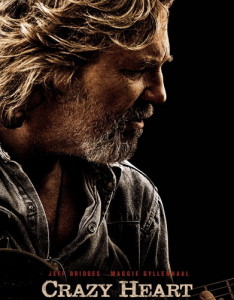
Watching the Academy Awards last night, you may have noticed something missing...from the Hyundai commercials.
Jeff Bridges, now an Academy Award winner, normally provides the voice behind the commercials; but Hyundai pulled him after he was nominated for the best actor award in Crazy Heart.
Stand-ins (or voice-ins) for Jeff Bridges, included Catherine Keener, Kim Basinger, David Duchovny, Richard Dreyfuss, Michael Madsen, Mandy Patinkin and Martin Sheen.
Hyundai walks away a winner too. The car company gets kudos for going along with the rules (the Academy limits any nominee from appearing in advertising during the awards), AND it now has a Oscar-winning spokesperson.
Daddy, May I Borrow Some Money to Buy a New Car?
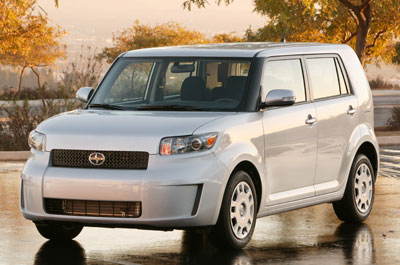
......................................................................................................................................................................
With so many brands cluttering the marketplace, it can be difficult to stand out. Many marketers have realized that it is much more beneficial to talk to consumers before brand loyalties have formed. It is easier to help form a brand loyalty with a product from scratch rather than try to convert an already brand loyal consumer, hence the emergence of Read more
Forget the Whales, Save Saturn
Do you remember your first car? I’m sure you remember when you first got it—how liberating it felt to hold the keys to your very own car. My first car arrived as a Christmas present from my generous grandparents. It was the perfect car. Shiny, clean, fast, fun.
It was a 1996 Saturn, and man, it was cool. My friends drove around in brand new 2002 VW’s, Jeeps, and Hondas. But 1996 was a great year for car manufacturers, and my car was better. The windows had to be rolled up manually, this is how major league baseball players used to build arm strength, before steroids. The stereo system sported a state of the art cassette deck. But best of all—it had a rubber bumper. Okay, maybe it was plastic, but if functioned like rubber. I could back into anything from a tree to a public library and just bounce right off. Perfect for new drivers.
Saturn built a brand around experiences like mine. Launched in the late 1980’s by General Motors, Saturn quickly became positioned as a family friendly brand. Their smaller, affordable, comfortable and safe models suited customers of all ages. New car buyers chose Saturn vehicles not only for the car, but for the Saturn experience. The Saturn sales staff quickly became your new family friend, concerned not only about your financial limitations but about your safety, your life, your children, your family. Saturn also cares about the bigger picture. Community involvement is a Saturn standard, they participate not only in sponsoring national causes but also make an effort to contribute to each local community that hosts a dealership.
As General Motors recently filed for bankruptcy protection, executives announced that they have a plan in motion for the company to quickly rebound and maybe even one day turn a profit again. Hummer was sold. Pontiac may dissolve. The future of the Saturn brand has yet to be set in stone. If it is sold, how would it be integrated into a new brand, and would the new ownership change Saturn’s core values, personality and voice? A possible sale to Penske Automotive Group is in the works, some say the pending sale could change the face of the way cars are manufactured and sold in the US. There are rumors of Penske shopping for a foreign manufacturer.
General Motors is proceeding with caution, as they should. The disappearance or tarnish of the Saturn brand would truly be a shame, and not just to Saturn owners. Saturn is an icon for the American family, and a model to branders everywhere for how to build a brand that embodies its core values in every internal and external communication outlet available.
Now, only time will tell what will happen to the Saturn brand. In the mean time, I hope whoever ended up with my old ’96 Saturn is taking care of my favorite car. And anytime they want to trade, I would be glad to have it back.
Contributed by Laine Beyerl
Branding Social Responsibility
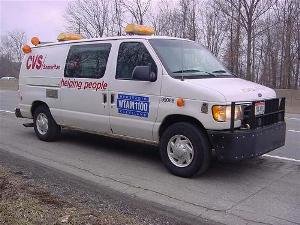 ......................................................................................................................................................................
......................................................................................................................................................................
On the way to work one morning I saw a large white van parked on the side of the highway assisting a stalled, sad car. As I drove by I read on the side of the van in big red letters, “CVS/Samaritan.” Having never heard of this I was eager to investigate what kind of service this was? Is there a fee or a helpline?
CVS/Samaritan has been around since 1978 but it is limited to a few cities: Chicago, Charlotte, Cincinnati, Cleveland, Boston, Detroit, Indianapolis, Providence, and Washington DC. CVS hired Samaritania, Inc., a private company in Massachusetts, to design, build, and run the CVS/Samaritan bus program. The CVS/Samaritan vans are staffed by drivers who are certified in many areas, including auto mechanics, medicine, and animal control. CVS/Samaritans cannot be summoned butRead more
